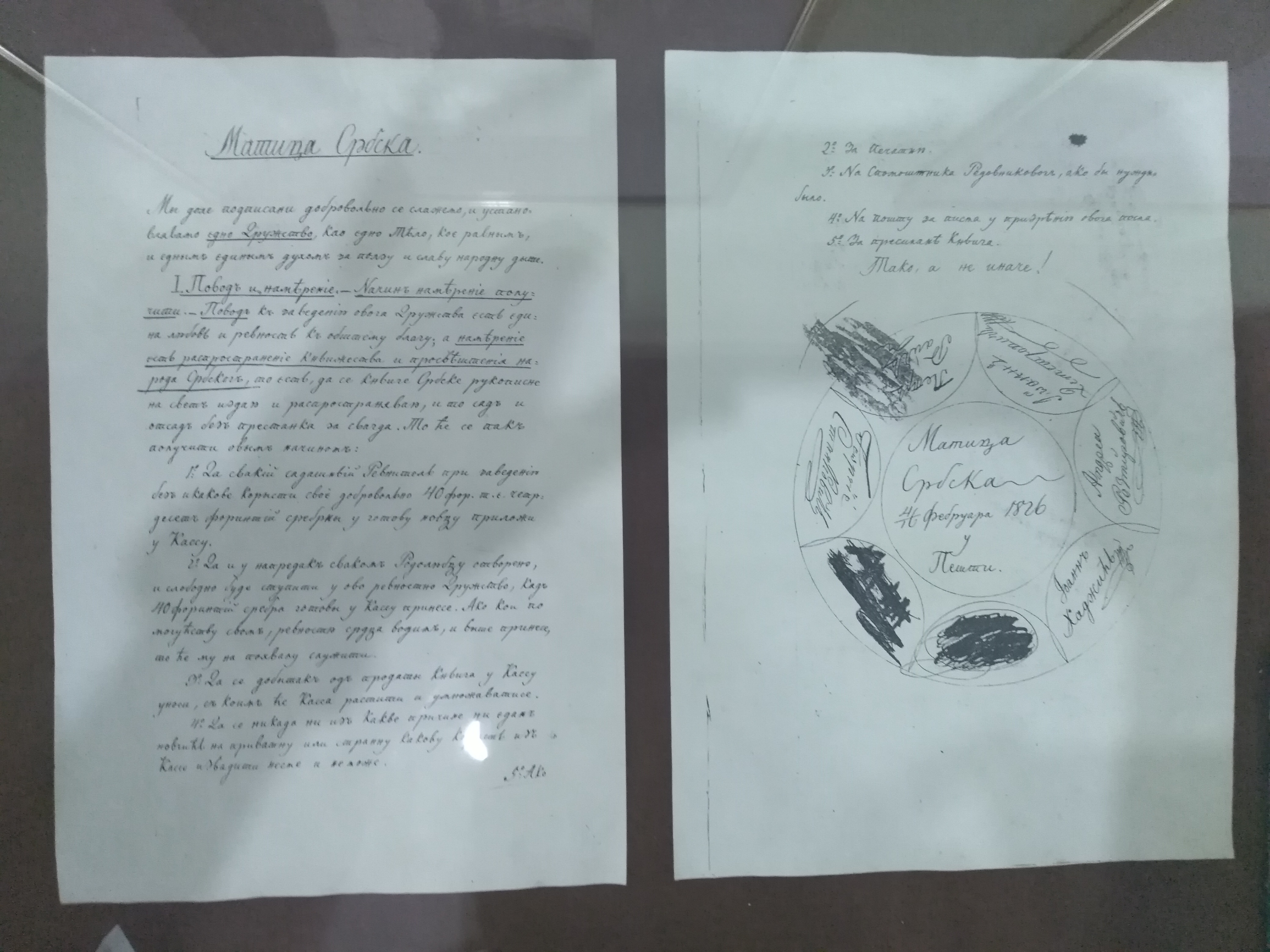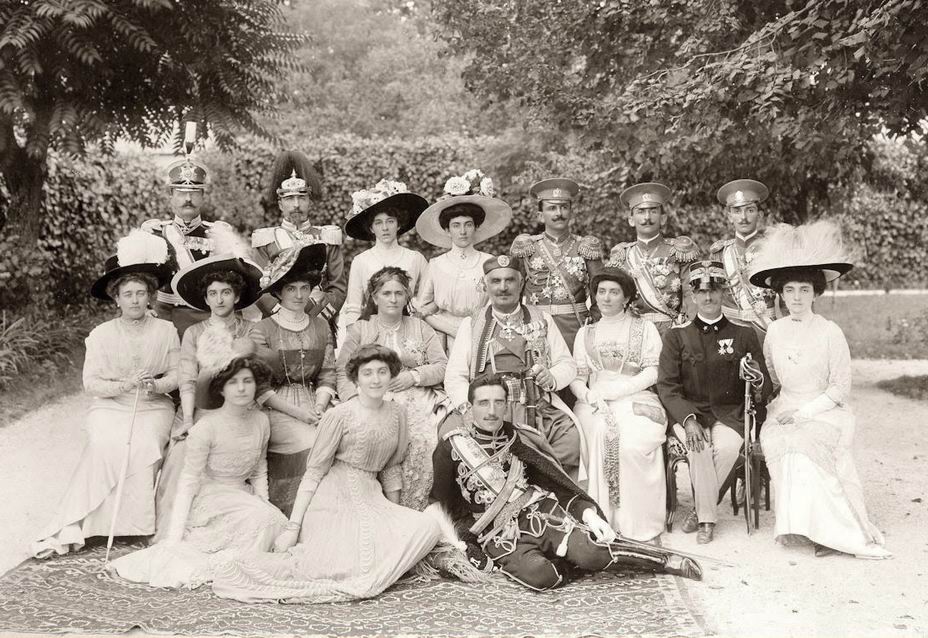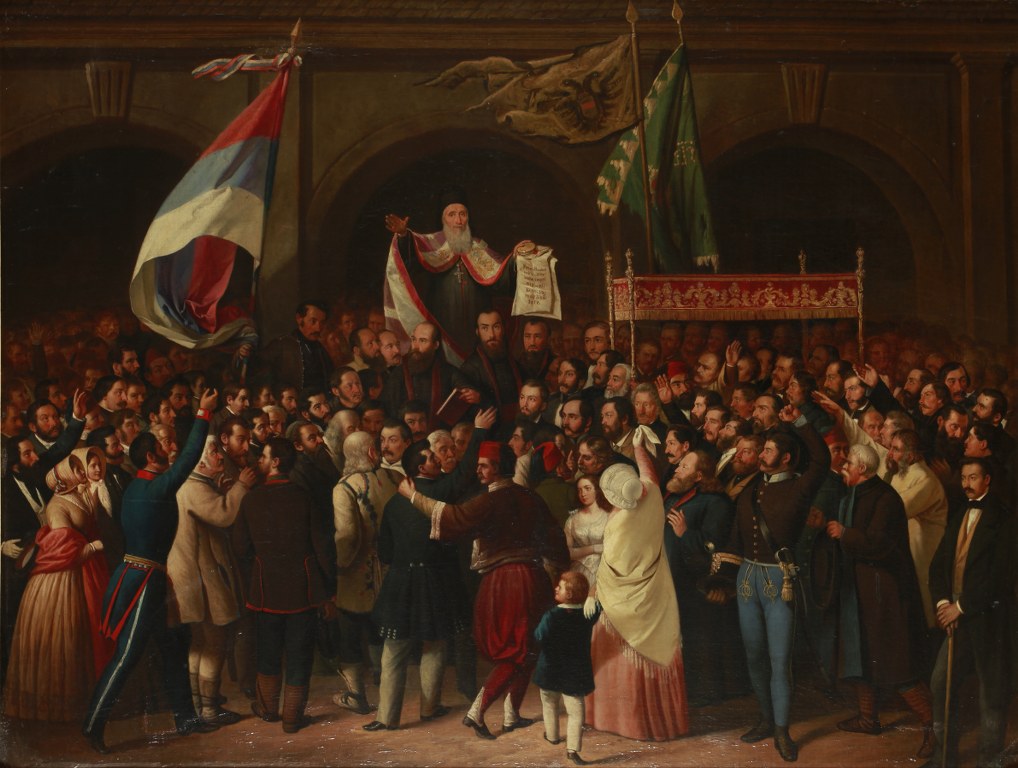|
United Serbian Youth
The United Serb Youth (), also known as ''Omladina'' ("the Youth"), was a diverse progressive Serbian political, cultural and national movement active between 1866 and 1872 among Prečani Serbs in Austria-Hungary as well as among Serbs in the Principality of Serbia itself. It was founded on the initiative of Vienna based Zora association at the congress of 16 youth organizations which took place in Novi Sad (at the time center of Serbian culture) between 15 and 18 August 1866. Alongside promotion of Serb emancipation and liberation the movement was also expressly pan-Slavist advocating primarily for South Slavic cooperation. Numerous future prominent Serbian writera who participated in the group's work included among others Laza Kostić and Jovan Jovanović Zmaj. Its slogan was "Srpstvo sve i svuda" (Serbdom all and everywhere). Two of its most prominent factions were liberal wing whose leader was Vladimir Jovanović and revolutionary wing with Svetozar Marković. The group was ... [...More Info...] [...Related Items...] OR: [Wikipedia] [Google] [Baidu] |
Matica Srpska
The Matica srpska ( sr-Cyrl-Latn, Матица српска, Matica srpska, ) is the oldest Serbian language independent, non-profit, non-governmental and cultural-scientific Serbian national institution. It was founded on June 1, 1826, in Pest, Hungary, Pest (today a part of Budapest) by the Serbs, Serbian Holy Roman Empire, habsburg legislator Jovan Hadžić and other prominent members of the Serbian Revolution and Serbian Revival, National Revival. The Matica was moved to Novi Sad in 1864. It is the oldest matica in the world. The main goals are to restore and promote Serbian national and cultural identity in the fields of art, science, spiritual creativity, economy and public life as well as to care for social development of Serbia. The literary and cultural society played a huge role in the flourishing of science and culture of the Serbs of Vojvodina, Serbia. The need for national homogenization, enlightenment, as well as the publication of Serbian books, were the main reaso ... [...More Info...] [...Related Items...] OR: [Wikipedia] [Google] [Baidu] |
Vuk Stefanović Karadžić
VUK or Vuk may refer to: *Vuk (name), South Slavic given name ** Vuk, Ban of Bosnia (), a member of the Kotromanić dynasty ** Vuk Karadžić (1787–1864), Serbian language reformer and folklorist, often referred to simply as Vuk * ''Vuk'' (film), an animated Hungarian movie from 1981 * ''Vuk'' (novel), a 1965 novel by Istvan Fekete *Vuk, a D'Bari character in the 2019 film ''Dark Phoenix'' *Vuk (computer), 1980s Yugoslavian computer prototype *VUK-T (glider), often called VUK, a 1970s high-performance Yugoslavian sailplane *'' Vuk.'', taxonomic author abbreviation for Ljudevit Vukotinović (1813–1893), Croatian naturalist *Volume Unique Key The Advanced Access Content System (AACS) is a standard for content distribution and digital rights management, intended to restrict access to and copying of the post- DVD generation of optical discs. The specification was publicly released i ..., in the AACS encryption system from the 2000s * Value Up Kit * Vertical up-kicker, a p ... [...More Info...] [...Related Items...] OR: [Wikipedia] [Google] [Baidu] |
Marko Miljanov Popović
Marko Miljanov Popović ( sr-Cyrl, Марко Миљанов Поповић, ; 25 April 1833 – 2 February 1901) was a Brda chieftain and Montenegrin general and writer. He entered the service of Danilo I, the first secular Prince of Montenegro in the modern era, and led his armed Kuči tribe against the Ottoman Empire in the wars of 1861–62 and 1876–78, distinguishing himself as an able military leader. He managed to unite his tribe with Montenegro in 1874. There was later a rift between Miljanov and Prince Nikola I. He was also an accomplished writer who gained repute for his descriptions of Montenegrin society. His grand-daughter Olgivanna Lloyd Wright headed Frank Lloyd Wright's iconic fellowship and foundation in the United States. Biography Marko was born in the village of Medun on 25 April ( St. Mark's Day) 1833, and was given the name "Marko" accordingly. His father was Miljan Jankov Popović, while his mother Borika was an Albanian Catholic born in Oraovo. H ... [...More Info...] [...Related Items...] OR: [Wikipedia] [Google] [Baidu] |
Nikola I Petrović
Nikola I Petrović-Njegoš ( sr-Cyrl, Никола I Петровић-Његош; – 1 March 1921) was the last monarch of Montenegro from 1860 to 1918, reigning as prince from 1860 to 1910 and as the country's first and only king from 1910 to 1918. His grandsons were kings Alexander I of Yugoslavia and Umberto II of Italy, among others. Biography Early life Nikola was born in the village of Njeguši, the home of the reigning House of Petrović. He was the son of Mirko Petrović-Njegoš, a celebrated Montenegrin warrior (an elder brother to Danilo I of Montenegro) and his wife, Anastasija Martinovich (1824–1895). After 1696, when the dignity of vladika, or prince-bishop, became hereditary in the Petrović family, the sovereign power had descended from uncle to nephew, the vladikas belonging to the order of the black clergy (i.e., monastic clergy) who are forbidden to marry. A change was introduced by Danilo I, who declined the episcopal office, married and converted Montene ... [...More Info...] [...Related Items...] OR: [Wikipedia] [Google] [Baidu] |
Nikola Pašić
Nikola Pašić ( sr-Cyrl, Никола Пашић, ; 18 December 1845 – 10 December 1926) was a Serbian and Yugoslav politician and diplomat. During his political career, which spanned almost five decades, he served five times as prime minister of Serbia and three times as prime minister of Yugoslavia, leading 22 governments in total. He played an instrumental role in the founding of Yugoslavia and is considered one of the most influential figures in Serbian twentieth-century history. With 12 years in office, Pašić was the longest-serving prime minister of Serbia. Born in Zaječar, in eastern Serbia, Pašić studied engineering in Switzerland and embraced radical politics as a student at the Polytechnical School in Zürich. On his return to Serbia, he was elected to the National Assembly in 1878 as a member of the People's Radical Party, which was formally organised three years later. After the failed Timok Rebellion against the government of King Milan I, he was sente ... [...More Info...] [...Related Items...] OR: [Wikipedia] [Google] [Baidu] |
Jevrem Grujić
Jevrem Grujić ( sr-Cyrl, Јеврем Грујић; November 8, 1827 – September 15, 1895) was a Serbian lawyer, politician, and diplomat who played a key role in shaping 19th-century Serbian politics. Known as an ideologue of Serbian liberalism, he was instrumental in drafting laws, serving in various government cabinets, and advocating for constitutional governance and national independence. His commitment to liberal ideals often placed him at odds with the absolutist regime of Prince Mihailo Obrenović, leading to multiple imprisonments, though public support frequently secured his release. Grujić’s career was marked by significant contributions to Serbian political and intellectual life. As a founding member of the Liberal Party and a minister in several governments, he championed modernisation, freedom of the press, and education. Grujić’s legacy endures through his writings, his political reforms, and his efforts to establish Serbia as an independent, progressive s ... [...More Info...] [...Related Items...] OR: [Wikipedia] [Google] [Baidu] |
Aleksandar Sandić
Aleksandar Sandić (Veliki Beckerek, Austrian Empire, today's Zrenjanin, Serbia, 14 May 1836 - Novi Sad, then Habsburg Monarchy, today's Serbia, 15 April 1908) was a Serbian historian, cultural worker and politician. He was an elected member of the Serbian Academy of Sciences and Arts, Serbian Royal Academy in 1897. Biography He was educated at Veliki Bečerek and Timișoara and studied law and Slavonic philology in Vienna with Franz Miklosich as a scholarship holder of Matica srpska, between 1857 and 1861. In Vienna, he met Vuk Stefanović Karadžić and became his secretary and energetic advocate for his language reform. In 1861 Sandić became a teacher of the Serbian language and literature at the Karlovci Gymnasium. In 1862 he joined the editorial board of the radical Viennese newspaper ''Ost und West,'' which tried to bridge the German world with the Slavic world. He worked as an assistant editor to Imbre Tkalec and after his departure, Sandić also worked as an editor for the ... [...More Info...] [...Related Items...] OR: [Wikipedia] [Google] [Baidu] |
Jovan Djordjević
Jovan Djordjević (born 22 January 1985), is a Serbian futsal player who plays for Marbo Intermezzo and the Serbia national futsal team The Serbia national futsal team represents Serbia in international futsal competitions such as the FIFA Futsal World Cup and the European Championships and is controlled by the Football Association of Serbia. Results and fixtures The followi .... References External links UEFA profile {{DEFAULTSORT:Djordjevic, Jovan 1985 births Living people Serbian men's futsal players Place of birth missing (living people) 21st-century Serbian sportsmen ... [...More Info...] [...Related Items...] OR: [Wikipedia] [Google] [Baidu] |
Sremski Karlovci
Sremski Karlovci ( sr-Cyrl, Сремски Карловци, ) is a town and municipality located in the South Bačka Districtautonomous province of Vojvodina, Serbia. It is situated on the banks of the Danube, from Novi Sad. According to the 2022 census results, it has a population of 7,872 inhabitants. The town has traditionally been known as the seat of the Patriarchate of Karlovci, Serbian Orthodox Church in the Habsburg Monarchy. It was the political and cultural capital of Serbian Vojvodina after the May Assembly and during the Revolution in 1848. Name In Serbian language, Serbian, the town is known as ''Sremski Karlovci'' (Сремски Карловци), in Croatian language, Croatian as ''Srijemski Karlovci'', in German language, German as ''Karlowitz'' or ''Carlowitz'', in Hungarian language, Hungarian as ''Karlóca'', in Polish language, Polish as ''Karłowice'', in Romanian language, Romanian as ''Carloviț'' and in Turkish language, Turkish as ''Karlofça''. The form ... [...More Info...] [...Related Items...] OR: [Wikipedia] [Google] [Baidu] |
Svetozar Miletić
Svetozar Miletić ( sr-cyr, Светозар Милетић; 22 February 1826 – 4 February 1901) was a Serbian lawyer, journalist, author and politician who served as the mayor of Novi Sad between 1861 and 1862 and again from 1867 to 1868. Family Miletić's ancestor was Mileta Zavišić, who came to Bačka from Kostajnica (present day Croatia) near the border of Bosnia where he led a company of three hundred men and fought against the Ottomans for thirty two years. Because the Ottomans wanted to punish him after they signed a peace treaty with the Austrians, Mileta moved to Bačka and changed his last name to Miletić. Mileta's son Sima, who was educated to be a merchant in Novi Sad, had fifteen sons and three daughters. Avram Miletić, the oldest of Sima's sons and grandfather of Svetozar Miletić, was a merchant and songwriter best known for writing the earliest collection of urban lyric poetry in the Serbian language. The second son of Avram Miletić, also named Sima l ... [...More Info...] [...Related Items...] OR: [Wikipedia] [Google] [Baidu] |
Vojvodina
Vojvodina ( ; sr-Cyrl, Војводина, ), officially the Autonomous Province of Vojvodina, is an Autonomous administrative division, autonomous province that occupies the northernmost part of Serbia, located in Central Europe. It lies within the Pannonian Basin, bordered to the south by the national capital Belgrade and the Sava and Danube Rivers. The administrative centre, Novi Sad, is the second-largest city in Serbia. The historic regions of Banat, Bačka, Syrmia and northernmost part of Mačva overlap the province. Modern Vojvodina is multi-ethnic and multi-cultural, with some 26 ethnic groups and six official languages. Fewer than two million people, nearly 27% of Serbia's population, live in the province. Name ''Vojvodina'' is also the Serbian word for voivodeship, a type of duchy overseen by a voivode. The Voivodeship of Serbia and Banat of Temeschwar, Serbian Voivodeship, a precursor to modern Vojvodina, was an Austrian province from 1849 to 1860. Its official name ... [...More Info...] [...Related Items...] OR: [Wikipedia] [Google] [Baidu] |
Giuseppe Mazzini
Giuseppe Mazzini (, ; ; 22 June 1805 – 10 March 1872) was an Italian politician, journalist, and activist for the unification of Italy (Risorgimento) and spearhead of the Italian revolutionary movement. His efforts helped bring about the independent and unified Italy in place of the several separate states, many dominated by foreign powers, that existed until the 19th century. An Italian nationalist in the historical radical tradition and a proponent of a republicanism of social-democratic inspiration, Mazzini helped define the modern European movement for popular democracy in a republican state. Mazzini's thoughts had a very considerable influence on the Italian and European republican movements, in the Constitution of Italy, about Europeanism and more nuanced on many politicians of a later period, among them American president Woodrow Wilson, British prime minister David Lloyd George, Mahatma Gandhi, Indian prime minister Jawaharlal Nehru, and Indian independence activis ... [...More Info...] [...Related Items...] OR: [Wikipedia] [Google] [Baidu] |





